Introduction
In recent years, Taiwan has emerged as the pinnacle of democracy in Asia and stands as an unique beacon in the Chinese-speaking realm. Over 400 years, Taiwan has evolved from foreign occupation and authoritarian rule to today’s flourishing democracy. The database provides an exclusive look into Taiwan’s democratic journey since 1949. It curates seminal democracy magazines from public forums in Taiwan and Hong Kong between 1949 to 1992, digitizing the influential footprints of opposition movements fading from library archives. The selected 10 journals encompass 39,000 articles, 150 million characters, 1,716 issues, and 6,000 authors. Arranged by publication year, they subtly evoke the historical inevitability of “passing the torch” and “interconnected circles.”

Our principles of selecting:
- Feature prominent opposition voices from Taiwan, Hong Kong, and China during the authoritarian era, challenging the ruling party and pioneering once-taboo topics.
- Sparked notable societal shifts and enlightened their generations.
- Are penned by esteemed sinologists or celebrated social science writers introducing groundbreaking ideas.

Democratic Review (民主評論) was an anti-totalitarian publication founded by Chiang Kai-shek and launched in Hong Kong by Hsu Fu-kuan. It was most influential and robust in its initial decade, when principal contributors included Qian Mu, Mou Zong-san, Tang Jun-yi, and Zhang Jun-mai. The magazine asserted that “the future of China rests on the establishment of culture and the sowing of thought.” Accordingly, it was regarded as the “flagship publication of contemporary Neo-Confucianists.”
The magazine preserved the complete writings of the greatest masters of Neo-Confucianism in the 1950s and 1960s and Wei Zheng-tong once described Hsu Fu-kuan’s driving spirit as “defending the Tao with traditionalism, discussing politics with liberalism.” Although “traditionalism” and “liberalism” are ordinarily anathema to each another, Democratic Review managed to act as a forge to merge them into a single alloy. Notably, Democratic Review demonstrated capacity for impartial criticism of the government of early sponsor Chiang Kai-shek, and serves a testament to the character and incorruptibility of its publisher.
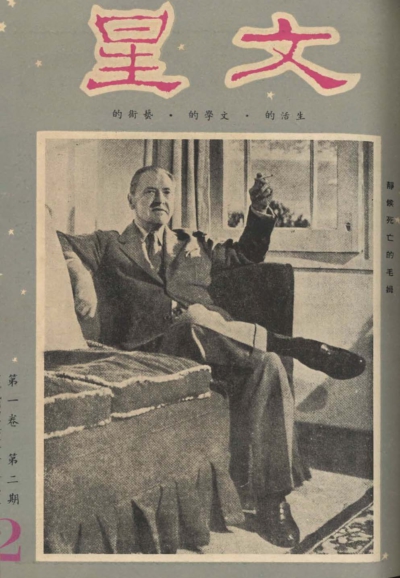
Continuing the spirit of the May Fourth Movement in China, Wenxing Magazine (文星雜誌) advocated circuitously democracy and liberalization. As an “ideological, daily, artistic, and literary” magazine, its authors included many well-known figures in the literary world of the latter half of the 20th century. Its covers featured predominantly western figures of contemporary literature, arts, science, philosophy, and politics to inspire readers to open their minds. Wenxing Magazine introduced new trends of contemporary thought, presented critiques of tradition, and advocated an iconoclastic stance towards liberty, rationalism, and democratic reform. It was just like a genuine beacon for enlightening the younger generation of its day. Its features such as the “Chinese and Western Cultural Debates” series between Li Ao and Hsu Fu-kuan, Hu Qiuyuan, and certain sensational articles (e.g. “The Elderly and the Stick”) startled Taiwan and brought the publication to international awareness. Accordingly, Wenxing Magazine became the most influential publication of Taiwan’s period of martial law after Free China.
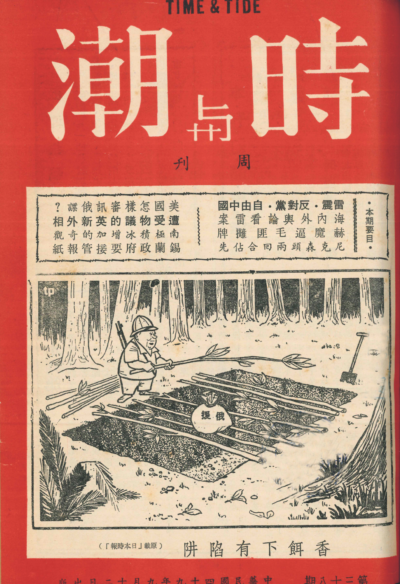
Founded in mainland China, Time & Tide (時與潮) resumed publication in Taiwan from 1959 to 1967, which is collected by the database. Its founder, Chi Shih-ying (齊世英), who is notable writer Chi Pang-yuan’s (齊邦媛) father, is also the main character of bestseller “The Great Flowing River” (巨流河) as well as a significant role of CC Clique within Kuomintang. The Institute of Modern History Academia Sinica ever published “Reminiscences of Mr. Shih-Ying Chi”. Chi Shih-ying and the founder of Free China, Lei Zhen, are both the early elites of Kuomintang. Furthermore, they planned together to form a new political party. Its style and keynote are similar to Free China on criticizing Kuomintang and seeking freedom and democracy.
While Free China has been digitized and circulated for many years, Time & Tide with similar-essence collects many more significant agendum and taboo articles, which is known by few people. Time & Tide was the only opposition voice from 1960 to 1975 when Free China had been banned publishing and Taiwanese local elites had not risen yet. Time & Tide quietly helped and taught the junior politicians outside of Kuomintang during this period, and recorded truthfully many exclusive historical data, including all the domestic and international reports/public opinions on the Lei-Zhen Incident, questioning vote rigging of local elections, challenging judges, policing and prison administration, demanding to lift press ban, etc.. Chi Shih-ying is always regarded as the sower of Taiwanese Democratic movement.
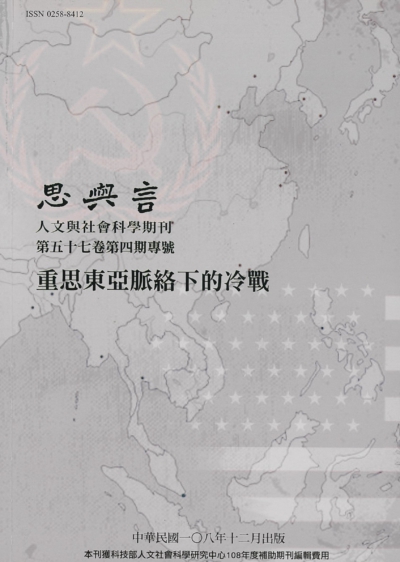
After Wenxin Magazine ceased publication in 1962, Thought and Words (思與言) was established in 1963 by Taiwanese intellectual elites and has been kept issuing to date. Its strong vision resulted in a tenure of 60 years of unceasing publication. As the longest-life journal of humanities and social sciences in Taiwan, and the sole existing periodical of this series, Thought and Words witnesses Taiwanese transitions and developments in academic trends, political climates, democratic systems, society and culture. Also, it serves as a nearly unparalleled record of the process of Taiwanese modernization and is always regarded as the great thought and writings collection of academic elites of several generations. Focusing on national politics and social issues, Thought and Words collects 2212+ outstanding papers whose contributors includes the academicians of Academia Sinica and other prominent scholars across 15+ subjects : politics, laws, society, anthropology, history, literature, philosophy, psychology, communications, education, economics, etc..
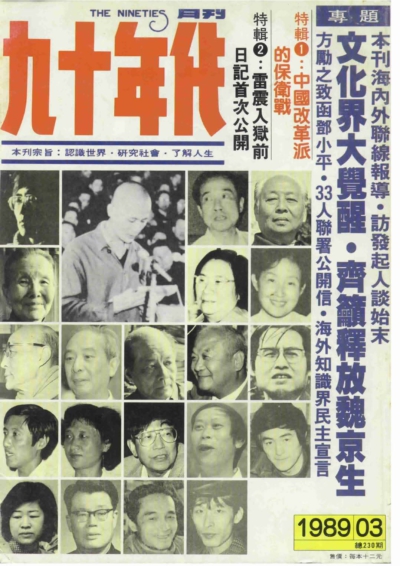
The Nineties Magazine (九十年代) was originally founded in Hong Kong , Taiwan edition was launched in 1990. It was the most influential forum for discussion of liberalization in the Chinese world, over the 70s, 80s and 90s. As a singular wall of democracy during the era of Chinese autocracy, The Nineties Magazine chronicled the seminal events of the last 30 years of the twentieth century in Greater China, including the evolution of Chinese political thought, the economic rise of Mainland China, the blossoming of democracy in Taiwan, the 1997 handover of Hong Kong to the People’s Republic of China, and the heightening of tensions across the Taiwan Strait. The archive collects nearly 8,000 articles by veteran journalists, renowned political observers and cultural critics, with bold critiques of government on both sides of the Taiwan Straits. Many politically sensitive articles not publishable elsewhere appeared in its pages, such as the memoir of Lei Chen, Lin Yi-hsuing’s confidential memorandum on the Formosa Incident, and the writings of Liu Bi-yan, Wang Ci-zhe, etc.. The Nineties Magazine is the indispensable chronicle of the central events of democratic development in greater China and is prized by Chinese intellectuals worldwide.
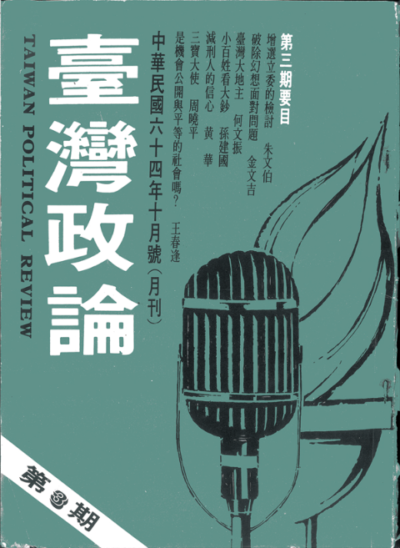
Taiwan Political Review (台灣政論) is the first high-quality, anti-KMT magazine founded by Taiwanese local elites, causing a great sensation when it was first published. It first combined civil activists and intellectuals, and was also the starting point for an organized, strategic anti-KMT movements. Prior to this magazine, Taiwan’s democracy movements were relatively grassroots. It is regarded as a paradigm for anti-KMT magazines and established the keynote for later opposition movements: participation in elections, parliamentary questions, magazine publications, masses movements, and street protests. It also demonstrated that magazines can function beyond propaganda and enlightenment, including talent recruiting/training, fundraising, and organizational mobilization.
Taiwan Political Review was the anti-KMT headquarters and organizational center for free speeches, and the source of a series of anti-KMT magazines that followed. It did not only bring Taiwan’s post-war democracy movements into a new stage of local leadership, but also laid the important foundation of “Taiwanese Identity”. The magazine’s topics included: local issues, Taiwanese history, discrimination against regional identities, and martial law issues.
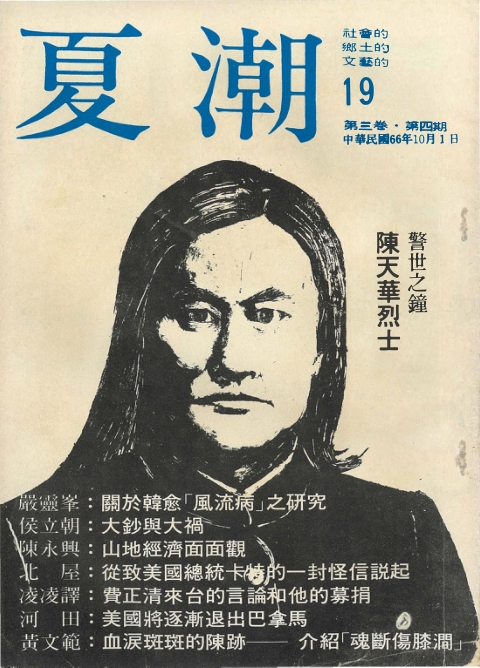
Founded by Su Qing-Li, The China Tide (夏潮) was a representative magazine of the left-wing and socialist in Taiwan in the 1970s. Almost all left-wing articles in Taiwan at that time were gathered in this magazine. The China Tide was an important member in Taiwan’s democratic movements, social reforms, and cultural self-awareness movements since 1970. The China Tide hopes to become “the reading material for the descendants of China, and a magazine for Chinese people” . It “hears the voices of all levels, rather than only the intellectuals. ” The members of the magazine came from different social strata in Taiwan, mostly with “nationalist” sentiments of “anti-imperialism and anti-capitalism,” and mixed with some “social justice” goals, aiming to achieve peaceful reunification of the Chinese nation and social equality and justice. It was repeatedly suppressed by Kuomintang regime but always rose again and again.
The cover clearly indicated that the magazine was positioned as “Social, Local, and Literary,” with columns covering various fields, such as “Window on the World” (such as the African American civil rights movement in the United States), “Cultural Trends” (such as Hu Shi’s discussions), “Local Folk Customs” (such as Chiang Wei-shui’s characteristics), “Literature and Art” (such as articles by Wu Yong-Fu and Chiang Hsun), and “Social, Economic, and Political Issues” (such as the investigation of the Zhongli Incident). In 1987, members also founded the “The China Tide Federation” and “The Labor Party” showing concern for workers, farmers, and environmental protection. It had unique contribution in the reorganization and interpretation of Taiwan’s history and local consciousness awakening.
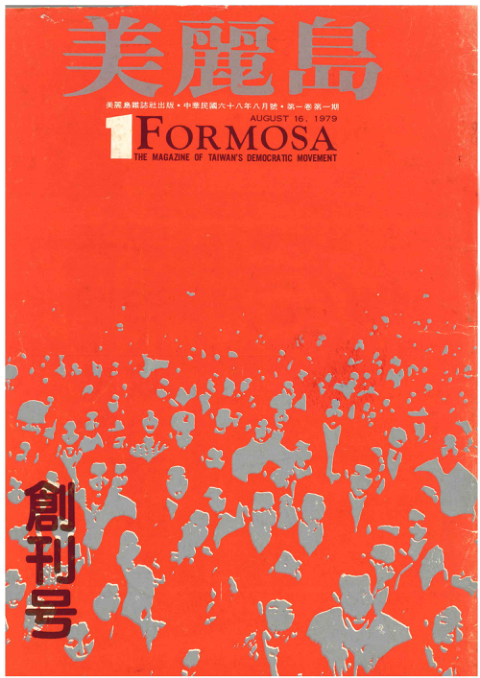
Formosa (美麗島雜誌) is the most well-known anti-KMT magazine taking radical approach in Taiwan’s martial law period. Founded in August 1979, it consisted of as many as 61 members of the board of directors, including Huang Hsin-chieh, Hsu Hsin-liang, Shih Ming-teh, etc., and other anti-KMT members. It was known as the organ publication of the anti-KMT movement and established branches and service centers in major cities throughout Taiwan, which were essentially equivalent to local party offices. After each service center was established, it would initiate speeches to the masses in that area. Its members ever triggered the “Formosa Incident” at the end of 1979, which was one of the most important political events in post-war Taiwanese history. Most important members were arrested and sentenced to heavy penalties under military law. Eventually, under international public opinions, they were given lighter sentences, but the magazine was seized. However, at the same time, it also inspired Taiwanese to reflect on the unreasonable authoritarian system and marked a turning point from a closed to an open ideology. After the incident, the authoritarian system gradually collapsed and eventually turned to democracy.
Formosa brought together many powerful articles dared to speak out, hitting the nail on the head about the Kuomintang’s one-party dictatorship. Formosa only had four issues, but due to the overwhelming populararity and a total circulation of 440,000 copies, it is the most widely-read political magazine in Taiwanese history.
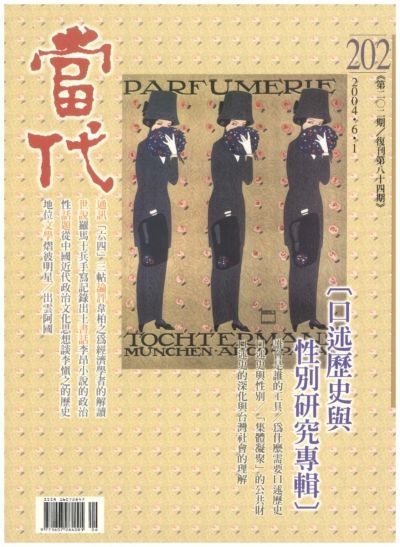
Founded in 1986 by former editor-in-chief of China Times, Jin Heng-Wei, Con-Temporary Monthly (當代雜誌) was a comprehensive magazine of humanist thought. As stated in the article, “The Contemporary and the Anti-Contemporary”: Con-Temporary Monthly‘s founding principle was the aspiration to make knowledge an important tool for participating in modern society, through intellectual discourse and bridging the spheres of academic and cultural communication. In the period of its founding, Con-Temporary Monthly set the standard for an alternative liberalism and presented the writings of preeminent contemporary scholars of the humanities and social sciences. Among its contributors were authors from North America, Europe, and Hong Kong.
Con-Temporary Monthly is the longest-running cultural/ideological magazine in Taiwanese history. Publication was twice halted and twice resumed, and Con-Temporary Monthly was awarded the Golden Tripod Award 10 times in its 25-yr. history. It constantly maintained its high quality of academic articles and news agenda even though it was twice halted and twice resumed. Since its second relaunch in 2010 under new president Chen Shi-Meng, the magazine has a renewed focus on Taiwan’s democratic development, justice, and human rights.

Taipei Society (澄社) was founded by seven renowned liberal scholars including Hoover Hu and Yang Kuo-Shu in 1989. It is a well-known group that “discusses politics but never participate in politics”. It positioned itself as “the third voice” between two major political parties, KMT and DPP, and aimed to criticize current issues and promote genuine democracy and fairness in Taiwan.
In the late 1980s, Taiwan underwent a transformation from authoritarianism, with lifting of martial law, political party ban, and newspaper ban. The long-repressed Taiwanese society was undergoing profound changes and entering a new era. The media pushed for political reform, and Taipei Society’s members exerted their influence adequately on political columns of several significant newspapers. They contributed articles on topics of media attention and social concern, such as analysis of Taiwan’s top ten problems, deconstruction of party-state capitalism, evaluation of legislators, constitutional reform proposals, and media reform. The database is just the complete collection of all the print content above.
After 2000, because many members of Taipei Society participated in politics, or had implicit or explicit cooperative relations with the ruling party, its power to criticize the authorities was greatly weakened, and eventually Taipei Society faded out of the public opinion market completely.
Information
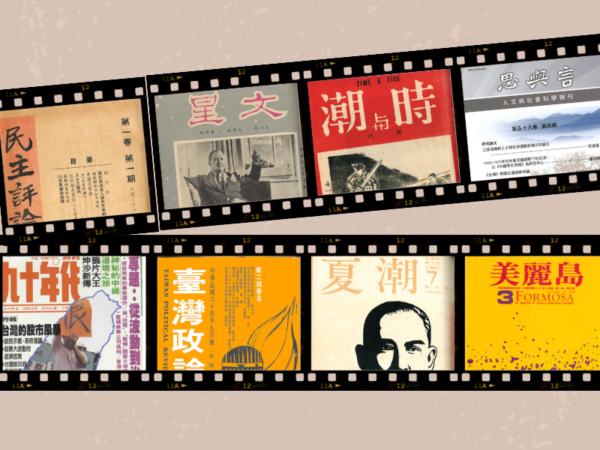
- Gathering masterpieces of humanities and social sciences
- Containing articles of pro-unification, independence and liberal school
- Exclusive content of full image
- Every milestone in public opinion forums across different generations
- A convergence of luminaries in classical Chinese studies and renowned social science writers
- An inclusive platform for pro-unification, pro-independence, and liberal scholars
- Exclusive classics with exclusive full-text search capabilities
